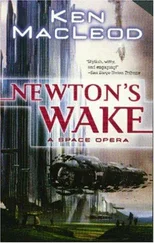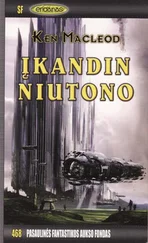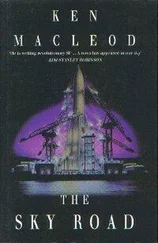“Synchronic Narrative Storm,” she said. Her grip was firm, her eyes amused.
“Horrocks Mathematical.” He hoped he didn’t look as embarrassed as he felt. No wonder he had almost recognised her. Atomic Discourse’s caremother had sent him a very sharp note when the girl had been training in his habitat, and something of her appearance and demeanour had accompanied it like a synaethesic scent.
“Ah, sorry about—”
She released his hand and waved in front of his face. “Forget it,” she said. “I was just being overprotective. Caremothers do, you know. Come on in and meet the gang.”
She led him past a long stone-walled pool in which fat, lazy mullets swam in salt water, to an area behind it at which a dozen or so people had gathered in the shade of orange trees. Some perched on the pool’s wall, others stood or sat around a few round white-painted wrought-iron tables. In a corner, chicken flesh sizzled on a barbecue. Horrocks recognised only Awlin Halegap, who sprang up to welcome him and introduce the rest. They were all founder generation, their skins deeply tanned, their teeth bright, their dress casual. Six men and seven women. Horrocks shook hands, filed names, tabbed faces, accepted a tall glass of clinking ice and flavoured dilute alcohol, and tuned his perceptions to the conversation.
As he’d expected, he couldn’t follow the buzz. It was not a question only of his elders’ higher bandwidth. Even in normal speech they carried more information than he could process. These people had known each other for centuries. Allusions zipped past his head like deflected meteors. He found himself missing jests, or laughing loud and alone. He began to wonder why he was there. It was only after the last gnawed chicken femur had been thrown on the coals and the last finger licked that Synchronic turned to him with an explanation.
“You’ve gambled in terrestrials,” she said. “So have we. Of course none of us expected such an interesting terrestrial, any more than you did. But unlike you, perhaps, we’ve leveraged some of our stakes into long futures — decades, even centuries in some cases.”
Horrocks nodded. “Wouldn’t be much use to me,” he said. “I expect to be out of here well before then.”
In ten or so years of normal development, the sun-line’s power supply would be switched over from the engine to a purpose-built power plant drawing on the Destiny Star system’s indigenous resources, most likely some combination of solar and fusion power. The cones would disengage from the great spinning cylinder, which would become an autonomous habitat and, in all probability, the hub of the system’s culture and commerce. The crew would construct a new cylinder, almost fill it with the right mix of asteroid rubble, metals, and organics, populate it with whoever wanted to be part of the next founder generation, fire up the engine to generate a new sunline, and away they would go, to repeat the whole process another few centuries hence.
“You don’t intend to stay?”
“No,” said Horrocks. “I’m crew, and that’s all there is to it.”
Synchronic gave him a teasing look. “You’re sure of that? Some of the crew always elect to stay.”
“And some of the founders always choose to go.”
She smiled at his riposte. “True enough. And it’s always a surprise, even for them, or so I’m told. But for now, you’re certain you don’t want to stick around here?”
“Yes.”
“Good,” she said, with a hint of regret. “That puts you in a good position to be objective. You see, our interests are potentially in conflict with those of the ship generation.”
Horrocks was shocked. The harmony of interests between the crew, the founder generation, and the ship generation was almost an axiom. He put down his empty glass and, without thinking, refilled it.
“I don’t understand,” he said. He looked around at the ancient faces and found no clue in them.
“You know the ship generation,” Synchronic said.
“Not as well, surely, as you,” he said.
She smiled, with a trace of impatience. “You’ve seen a lot more of them since they grew up than I have. You’ve trained scores of them.”
Horrocks nodded. “Hundreds. I’ve been favourably impressed. They’re enthusiastic, eager to learn, quick to pick up.”
“I should hope so,” said Synchronic. She glanced around the others. Something flashed between them, too fast for Horrocks to decode. “They were raised for this adventure; they were, in a sense, bred for it. That’s our problem.”
“I still don’t see the problem.”
Chandrasekhar Limit Lamont, a habitat-design entrepreneur in a blue skirt and a buzz cut, leaned forward, elbows on knees, spreading greasy fingers. “They’re eager to start colonising,” he said. “The ship is like a seedpod about to burst.”
Horrocks nodded. “Of course,” he said. He wondered if the man knew of his wonderment at the plant genetic machinery dispersal system. Unlikely — the image would be familiar to the flatfooter. “If I’d grown up in one of the small settlements, getting out would be the foremost thing on my mind. Apart from sex, I suppose.”
Synchronic laughed. “It’s the same thing.”
“Still,” said Horrocks. “The problem with that?”
“Is that we may have to delay colonisation,” said Chandrasekhar.
Horrocks had heard the option being bandied about, on the margins of the raging debates about whether or not to contact the aliens. Hearing it put forward as a serious possibility startled him.
“If you want to know how the ship generation will react to that ,” he said, “you don’t need me to tell you. You already know the answer. They’ll not stand for it. They’ll be furious.”
Chandrasekhar nodded. “That’s what we expect, yes. We were curious as to whether you would confirm it. Nevertheless, it’s a step we may be forced to, in the… awkward circumstance.”
“Why?” Horrocks asked. “Everyone’s tooled up for the usual sky-down approach. We don’t have to go near the terrestrial for centuries. Or any of the planets, come to that. Apart from scooping helium 3 from the gas giant. The aliens don’t even have to notice us.”
“Oh, they’ll notice us,” said Armstrong Phillipic Natura, an artist. She regarded him over the rim of her glass. “Unless we stealth all our comms, which is impracticable. And as soon as we start doing things, they’ll see the industry.”
“What if they do?” Horrocks asked. “It still doesn’t affect them. Not until they get space travel, anyway. And when they come out, we’ll have plenty to offer them, and no doubt they us.”
“It’ll affect them long before they get space travel,” said Chandrasekhar Limit.
“We know this?” Horrocks asked.
The three who had just spoken to him exchanged looks.
“How much,” asked Synchronic, “do you know about what people did before they lived in caves?”
The shade had covered the sunline. A few lights had come on in the courtyard. Small insects had become bothersome. Horrocks stood staring into the pool. Mullets nibbled at what he had spewed in it. The sight failed to disgust him. He felt cold. He did not look again at the pictures that Armstrong Phillipic had conjured in his head, but their images remained in his memory. It wasn’t that they were news to him. He’d known, in the abstract, that terrible things had happened in the deep past. Everybody did. It was part of education. But — wisely, he now thought — the teachers and careparents and even the history texts had never brought it home to him; never rubbed his nose in it; never given him the full picture.
The pictures were bad enough, but it was the mentality that had produced the reality they depicted that had shocked him. His prehistoric ancestors seemed more alien than anything down on Destiny II. No, that wasn’t it: they were precisely as alien, and the aliens as prehistoric.
Читать дальше












